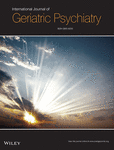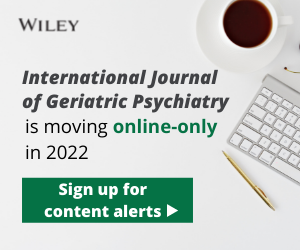Journal list menu
Export Citations
Download PDFs
ISSUE INFORMATION
REVIEW ARTICLE
Sleep disturbances in Lewy body dementia: A systematic review
- First Published: 19 September 2022
-
At least one form of sleep disturbance may be present in as many as 90% of people with Lewy body dementia(LBD).
-
Subjectively poor sleep quality, excessive daytime sleepiness, and rapid eye movement behaviour disorder are more common and severe in Lewy body dementia relative to other dementias.
-
High-quality Lewy body dementia-specific treatment studies are urgently needed for these symptoms, as the current evidence base is very weak.
-
Current clinical management guidelines for LBD sleep disturbances mainly include the use of sleep hygiene, or pharmacological agents; some agents are associated with negative side effects.
RESEARCH ARTICLE
‘Pushing back’: People newly diagnosed with dementia and their experiences of the Covid-19 pandemic restrictions in England
- First Published: 18 August 2022
-
Research conducted directly with people with dementia, exploring their lived experiences, is helpful for understanding the ways in which they respond as ‘active social agents’ to challenges in their lives.
-
People recently diagnosed with dementia reported a range of challenges and negative experiences associated with the Covid-19 pandemic including loneliness and loss of social routines; difficulties in accessing and trusting health services; dementia-unfriendly practices and challenges ‘getting out’ into the physical neighbourhood.
-
They responded to challenges by maintaining and extending social networks; learning new skills; supporting others and engaging in reciprocal exchange, including with peers; seeking help and advocacy and challenging and resisting dementia-unfriendly practices; maintaining and adapting habitual spatial practices; and employing a range of emotional coping strategies.
-
Support for people with dementia during public health crises should aim to create social and environmental circumstances that enable people with dementia to help sustain their own well-being.
Association between depression, gender and Alzheimer's neuropathology in older adults without dementia
- First Published: 25 August 2022
-
We investigated whether recent or remote depression was associated with Alzheimer's neuropathology in older adults without dementia and whether sex moderated these relationships.
-
Older adults with recently active depression (within previous 2 years) but not a more remote history of depression were more likely to have higher Thal phase scores (indicating greater amyloid spread beyond the neocortex) compared to those without a history of depression. Sex did not moderate this relationship.
-
Our findings indicate that the association between late life depression and Alzheimer's neuropathology is associated with spread of amyloid pathology beyond the neocortex to include allocortical and subcortical regions critical for regulation of mood and motivated behavior.
Potential beneficial effects of masupirdine (SUVN-502) on agitation/aggression and psychosis in patients with moderate Alzheimer's disease: Exploratory post hoc analyses
- First Published: 21 September 2022
-
Alzheimer's disease (AD) is a neurodegenerative disorder with manifestations of cognitive decline, functional impairment, and neuropsychiatric symptoms (NPS), with massive unmet need for the safe and effective treatment of NPS.
-
Post hoc analyses suggested masupirdine significantly reduced agitation/aggression, and psychosis in subgroup of patients with AD.
-
Masupirdine is being evaluated in a phase-3 trial for the treatment of agitation/aggression in patients with AD type dementia.
MoCA in five Indian languages: A brief screening tool to diagnose dementia and MCI in a linguistically diverse setting
- First Published: 31 August 2022
-
Montreal Cognitive Assessment (MoCA) is a widely used brief cognitive screening test for detecting dementia and mild cognitive impairment (MCI) globally. Due to the socio-demographic and linguistic diversity that prevails in India, it is essential to establish brief screening tools and norms that are culturally and linguistically appropriate to diagnose dementia and MCI at community and clinical levels.
-
The MoCA was adapted and validated in five Indian languages (Hindi, Bengali, Telugu, Kannada, and Malayalam). The diagnostic accuracy of Indian version of MoCA was excellent with good sensitivity and specificity in diagnosing dementia and MCI.
-
The adapted and validated Indian version of MoCA can identify cognitive decline and contribute to clinical, research and rehabilitative efforts to reduce burden of dementia in the country.
Delirium in older COVID-19 patients: Evaluating risk factors and outcomes
- First Published: 25 August 2022
-
A previous episode of delirium and pre-existent memory problems were independent predictors of delirium risk in older adults hospitalized with COVID-19.
-
Reports on the association of delirium with poor outcomes, independent of frailty, in older hospitalized COVID-19 patients have been conflicting.
-
In this study, delirium was not a predictor of in-hospital mortality independent of frailty.
The pain and depressive symptoms cascade: A bidirectional analysis of the Mexican Health and Aging Study 2012–2015
- First Published: 19 September 2022
-
In Mexico, older adults (60+) with either pain or elevated depressive symptoms were at risk for developing the other health condition.
-
Shared predictors included older age, female gender, fair/poor self-rated health, and limitations in activities of daily living, which could serve to identify patients in clinical settings.
-
There were gender nuances in the predictors of incident elevated depressive symptoms or pain, which underscore the importance of considering traditional and social gender norms when evaluating either.
Paradoxical age-related improvement in mental health in U.S. military veterans: Results from the national health and resilience in veterans study
- First Published: 20 August 2022
-
Previous research suggests that a “paradoxical” trend in which mental health improves as a function of increasing age despite age-related declines in physical and cognitive health.
-
In the present study, physical health scores were consistently average and stable until around age 80 when they declined while cognitive and mental health scores were markedly lower in young veterans and then increased linearly and positively well into late-life.
LETTER TO THE EDITOR
Mental health of Filipino older adults with dementia during COVID-19 pandemic: Reflections and viewpoints
- First Published: 31 August 2022





